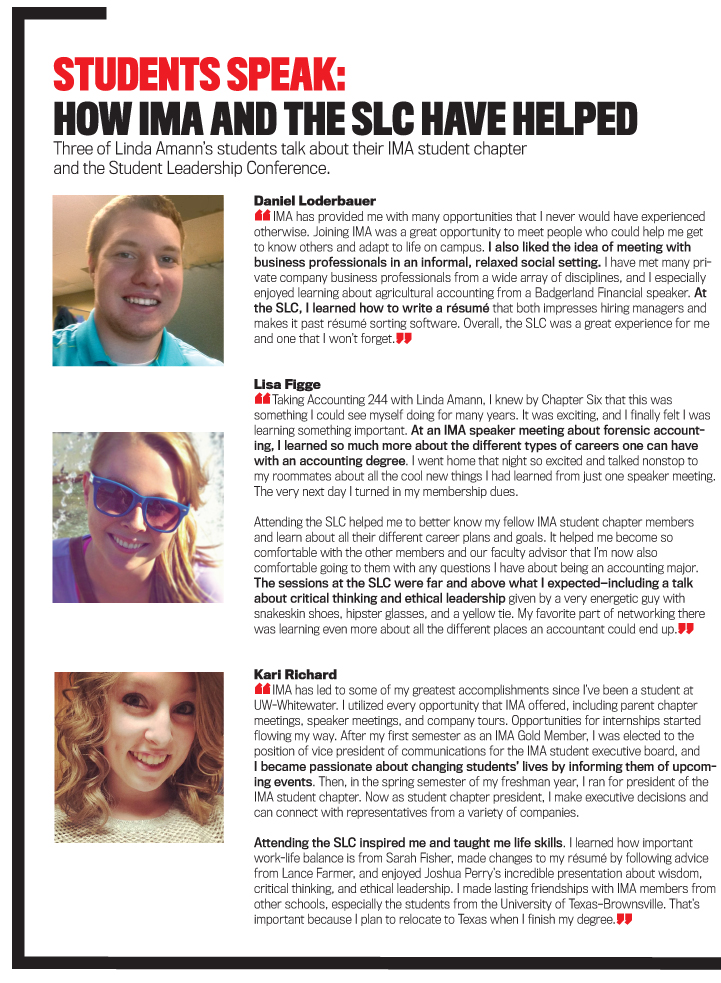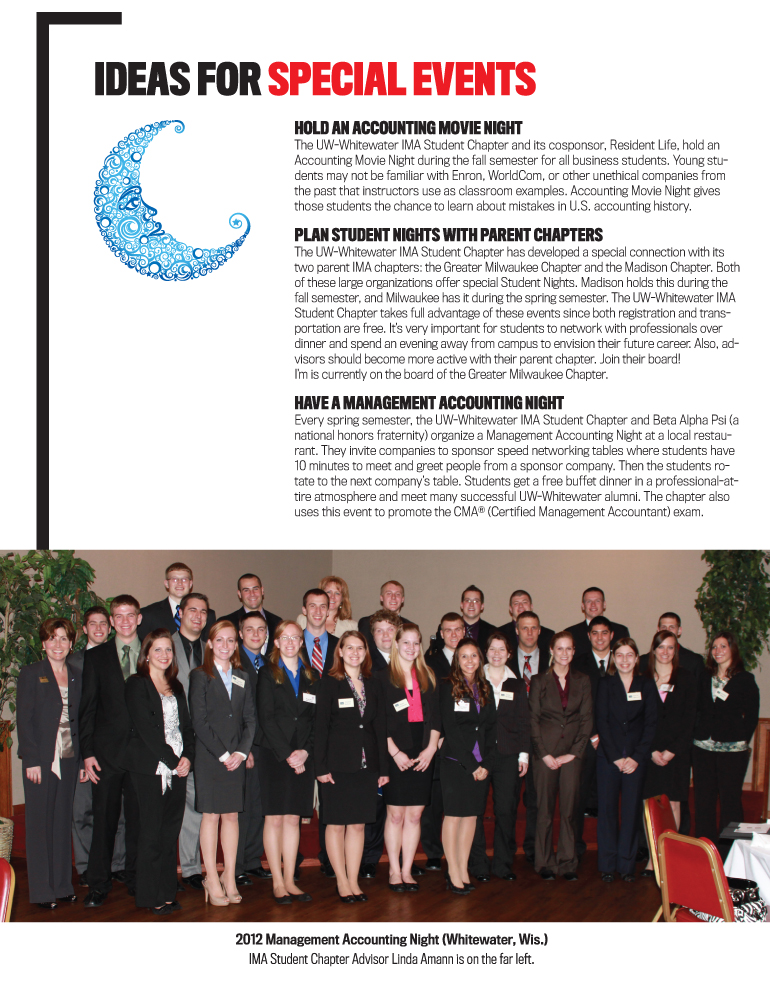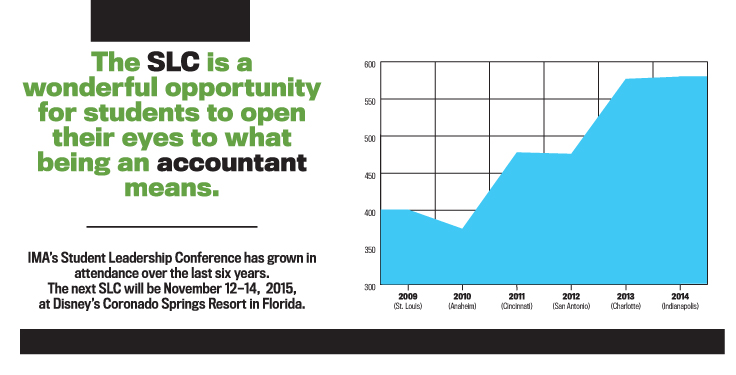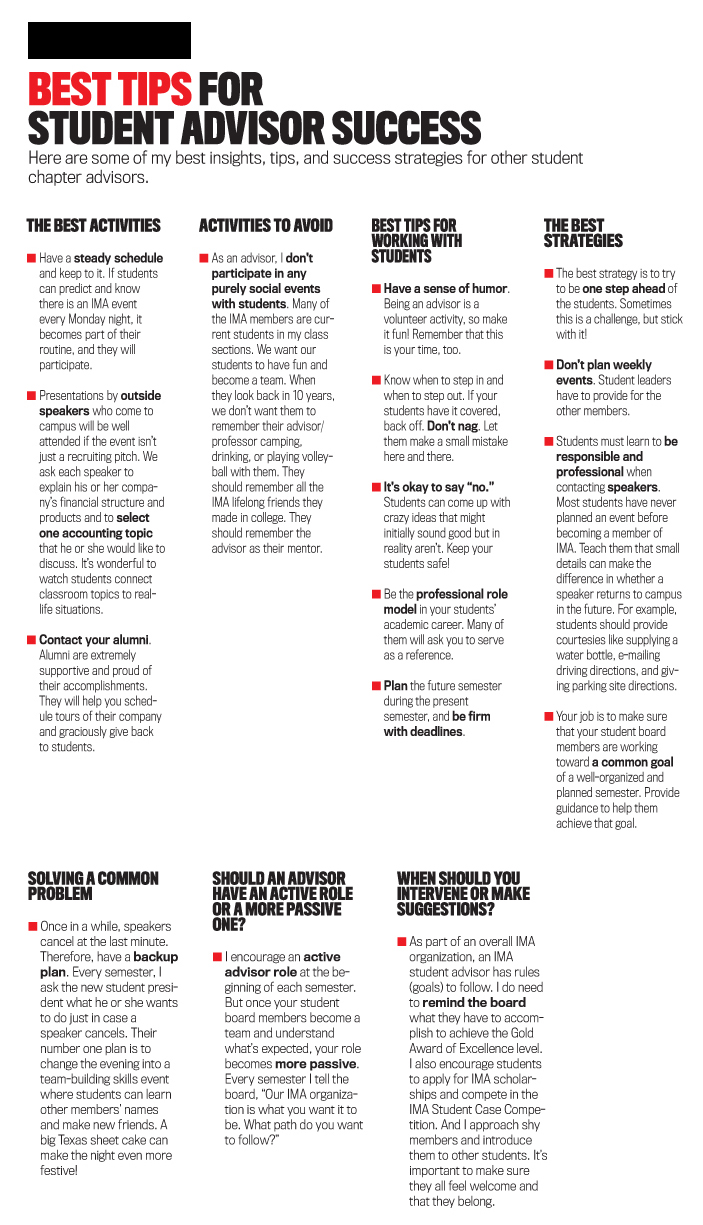I began my career at the University of Wisconsin (UW)-Whitewater campus in 2007 teaching introduction to financial accounting classes. My professional background includes accounting for hospitality, construction, nonprofit, and manufacturing with an emphasis on enterprise resource planning (ERP) systems. In addition, for many years I was an information technology (IT) manager overseeing a company’s software, hardware, and security. With my extensive private industry experience, I was eager to contribute to UW-Whitewater’s accounting student organizations—and especially to IMA. I happily accepted a request to become the IMA volunteer faculty advisor in 2008.
I was new to both the UW-Whitewater campus and the role of advisor, so I had much to learn as I wove my way through various campus and IMA rules. But over the years, I learned that the way you present material to students is critical in cultivating the right mind-set. So instead of talking about rules, I now call them goals. That makes them something to look forward to, achievements that students will be proud to accomplish. To view some comments from my students, see “Students Speak: How IMA and the SLC Have Helped.” The students were all winners of SLC scholarships sponsored by Wipfli (a Milwaukee, Wis., CPA (Certified Public Accountant) and consulting firm) and a UW-Whitewater IMA alumni.
I walked into the first Monday night chapter meeting of the fall 2008 semester with a positive attitude and a willingness to help the students find a direction. That year, we had 20 student members. From there, we have had a healthy growth every year, peaking in 2013 with 135 members. Along the way, the word got out across the campus that this was the student organization to join. The goals of my student team were to learn more about private sector accounting careers, create a network by partnering with the parent IMA Madison and Greater Milwaukee Chapters, and have some fun.
PROMOTING A VALUABLE HIDDEN GOAL
Unknown to the UW-Whitewater students, I did have another goal. I never shared it with them because it involves something I want them to discover on their own: mastering leadership skills. During our awards night function at the end of each semester, the students elect nine members to their executive board. The new board members are the student organization leaders who create the schedule of student chapter activities for the following semester and organize all events. (For a discussion of some innovative events to schedule, see “Ideas for Special Events”.)
The board has complete responsibility for making next semester’s student events successful. It’s amazing to watch the change from the very first time that the nervous, newly elected president takes charge of the team to the end of the semester when leadership confidence shines through. The new board members always struggle with public speaking and working with others. In reality, they are learning about leadership and don’t even realize it.
As an advisor, you always want the best for your student organization and for the individual members. You research new ideas, encourage students to participate in IMA competitions, make sure the organization is following the goal-oriented IMA Award of Excellence guidelines, and inspire students to attend events. (See my list of “Best Tips for Student Advisor Success” at the end of the article).
NO SUMMER DOLDRUMS ALLOWED!
During the summer, the role of an advisor doesn’t stop. That’s when each year actually begins with “save the date” e-mails to all members of the IMA student chapter. I use this personalized notification to tell students that there’s a big event coming in November: the IMA Student Leadership Conference (SLC). I tell students to plan ahead and join the fun. I encourage all the members to participate: “Anyone can attend—why not you?”
And when students reply, “Why should I attend? What’s in it for me?” I explain that networking, gaining new knowledge and insights, traveling outside Wisconsin (which many haven’t done), and contributing to the SLC’s success is so important for their professional careers. Answering students’ questions in an inspiring and persuasive way is one of an advisor’s most important tasks. You must encourage, promote, and explain.
The SLC is a wonderful opportunity for students to open their eyes to what being an accountant means. In addition to terrific keynote speakers offering valuable career strategies, the SLC always includes several educational and exciting networking events (manufacturing tours, social dances, boat trips, games, and so forth). What students learn and the contacts they make provide benefits that can last an entire career. That’s why every year, UW-Whitewater sends as many students as possible to this wonderful event. If the event is held close to UW-Whitewater, we carpool to get there. If it’s a little farther, we rent a coach bus. For more distant conferences, we fly. Although air travel is always a challenge, we had 15 students attend the 2012 SLC in Texas—an amazing turnout since our students must pay for their own airline tickets. The student board organizes the travel arrangements for all participating members. They are in charge, and they must use their developing leadership skills to have a successful trip. In all of my years as advisor, we haven’t missed a flight, lost a student, or stumbled with incorrect directions. The worst thing that happened was almost gaining some extra luggage in Ohio from another student chapter.
As educators, we would like to see students advance beyond the regular classroom. Their next step would be to join a student organization to attend weekly IMA campus meetings and company tours each semester. The purpose is to expose them to outside speakers so they can apply their classroom studies to real-world situations. I love to watch students nod their heads in agreement with a speaker discussing a topic that was covered in class. Attending the SLC, students can go further with their classroom studies because the Conference features speakers exploring a wide variety of topics from current hot issues to long-standing principles. Students begin to realize that armed with this knowledge they, too, can pass both parts of the CMA exam.
SEEING THE FUTURE
The SLC also gives our students the ability to look beyond their campus life and envision their future as management accounting professionals. They can expand their network by meeting other students from across the country and abroad. And the SLC enables students to build their independence, look out for each other, be accountable for their actions, and perhaps take away one or two life-changing lessons from the speakers. Over the years I have listened to many fabulous IMA speakers. I always look across the room and notice which students are paying attention. They’re the ones for whom the speaker is making a difference. And if the current speaker doesn’t capture some students’ attention, maybe the next one will. Just one speaker can make a lasting difference in a student’s career and in developing leadership skills.
If you’re a student, come to the SLC and have some fun. It’s a nice break from classes, and you can make new friends, learn something new, and gain a better understanding of what becoming a CMA means. Of course, the SLC can also make students better leaders. But don’t tell my students—that’s still my secret!

August 2015








